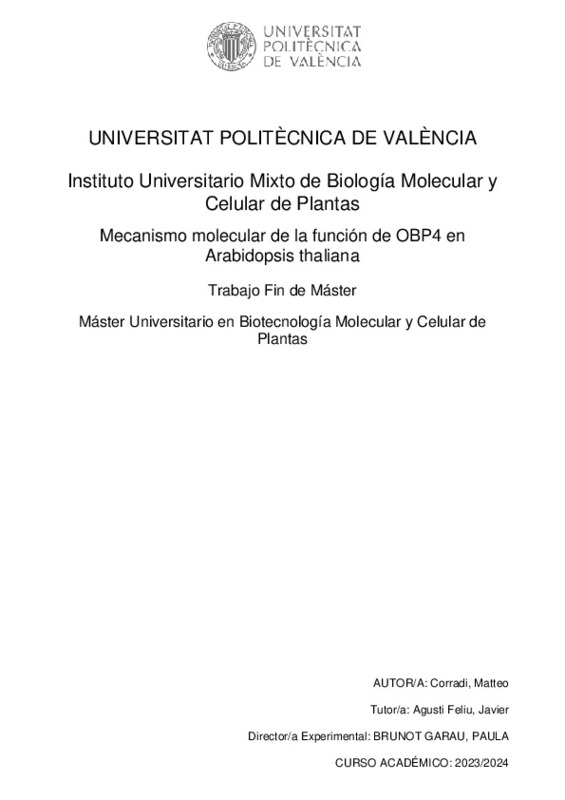|
Resumen:
|
[ES] A través de un análisis transcriptómico sobre ecotipos de Arabidopsis con diversas
capacidades para el desarrollo del crecimiento secundario, el grupo del Dr. Agustí
identificó OBP4 como un posible regulador del ...[+]
[ES] A través de un análisis transcriptómico sobre ecotipos de Arabidopsis con diversas
capacidades para el desarrollo del crecimiento secundario, el grupo del Dr. Agustí
identificó OBP4 como un posible regulador del proceso (Brunot et al., no publicado).
Experimentación genética posterior evidenció que OBP4 regula negativamente el
proceso (Brunot et al., no publicado), lo cual cuadra con información existente sobre
OBP4 que indica que es un regulador negativo del ciclo celular. Los análisis fenotípicos
demostraron que obp4 tiene un crecimiento general más vigoroso que WT, al contrario
que las líneas de sobrexpresión del gen, que muestran un crecimiento marcadamente
atenuado. El grupo, además, observó que, tanto para el mutante como para las líneas de
sobrexpresión, estas diferencias son mucho más marcadas en condiciones de baja
temperatura (16ºC), y mucho más leves en condiciones de temperaturas altas (28ºC), lo
cual indica que el efecto regulador del crecimiento por OBP4 es dependiente de
temperatura. Datos transcriptómicos sugieren que la expresión de OBP4 podría estar
regulada por hormonas. En este marco conceptual, este proyecto explorará el efecto de
las hormonas, así como de diferentes rangos de temperaturas, sobre la expresión de
OBP4. Además, se llevarán a cabo ensayos para identificar las dianas de OBP4 durante
la regulación del crecimiento y se investigará si la eficiencia de activación (o represión)
de OBP4 sobre estas dianas varía con la temperatura así como la posible variación del
repertorio de dianas de la proteínas en función de dicho parámetro.
[-]
[EN] [EN] Through transcriptomic analysis of Arabidopsis ecotypes with diverse capacities for secondary growth development, Dr. Agustí's group identified OBP4 as a possible regulator of the process (Brunot et al., unpublished). ...[+]
[EN] [EN] Through transcriptomic analysis of Arabidopsis ecotypes with diverse capacities for secondary growth development, Dr. Agustí's group identified OBP4 as a possible regulator of the process (Brunot et al., unpublished). Subsequent genetic testing showed that OBP4 negatively regulates the process (Brunot et al., unpublished), which is consistent with existing data on OBP4 indicating that it is a negative regulator of the cell cycle. Phenotypic analyses showed that obp4 has an overall more vigorous growth than WT, in contrast to the gene overexpression lines, which show markedly attenuated growth. The group further observed that, for both the mutant and the overexpression lines, these differences are much more pronounced under low temperature conditions (16°C), and much milder under high temperature conditions (28°C), indicating that the growth-regulating effect of OBP4 is temperature-dependent. Transcriptomic data suggest that OBP4 expression may be regulated by hormones. Within this conceptual framework, this project will explore the effect of hormones, as well as different temperature ranges, on OBP4 expression. In addition, assays will be carried out to identify OBP4 targets during growth regulation and investigate whether the activation (or repression) efficiency of OBP4 on these targets varies with temperature as well as the possible variation of the protein target repertoire as a function of this parameter.
[-]
|







